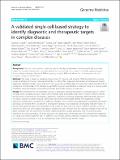| dc.contributor.author | Gawel, Danuta R. | |
| dc.contributor.author | Serra-Musach, Jordi | |
| dc.contributor.author | Lilja, Sandra | |
| dc.contributor.author | Aagesen, Jesper | |
| dc.contributor.author | Arenas, Alex | |
| dc.contributor.author | Asking, Bengt | |
| dc.contributor.author | Bengnér, Malin | |
| dc.contributor.author | Björkander, Janne | |
| dc.contributor.author | Biggs, Sophie | |
| dc.contributor.author | Ernerudh, Jan | |
| dc.contributor.author | Hjortswang, Henrik | |
| dc.contributor.author | Karlsson, Jan-Erik | |
| dc.contributor.author | Köpsen, Mattias | |
| dc.contributor.author | Lee, Eun Jung | |
| dc.contributor.author | Lentini, Antonio | |
| dc.contributor.author | Li, Xinxiu | |
| dc.contributor.author | Magnusson, Mattias | |
| dc.contributor.author | Martínez-Enguita, David | |
| dc.contributor.author | Matussek, Andreas | |
| dc.contributor.author | Nestor, Colm E. | |
| dc.contributor.author | Schäfer, Samuel | |
| dc.contributor.author | Seifert, Oliver | |
| dc.contributor.author | Sonmez, Ceylan | |
| dc.contributor.author | Stjernman, Henrik | |
| dc.contributor.author | Tjärnberg, Andreas | |
| dc.contributor.author | Wu, Simon | |
| dc.contributor.author | Åkesson, Karin | |
| dc.contributor.author | Shalek, Alexander K | |
| dc.contributor.author | Stenmarker, Margaretha | |
| dc.contributor.author | Zhang, Huan | |
| dc.contributor.author | Gustafsson, Mika | |
| dc.contributor.author | Benson, Mikael | |
| dc.date.accessioned | 2020-01-23T22:49:52Z | |
| dc.date.available | 2020-01-23T22:49:52Z | |
| dc.date.issued | 2019-07-30 | |
| dc.date.submitted | 2019-04-09 | |
| dc.identifier.issn | 1756-994X | |
| dc.identifier.uri | https://hdl.handle.net/1721.1/123667 | |
| dc.description.abstract | Background: Genomic medicine has paved the way for identifying biomarkers and therapeutically actionable targets for complex diseases, but is complicated by the involvement of thousands of variably expressed genes across multiple cell types. Single-cell RNA-sequencing study (scRNA-seq) allows the characterization of such complex changes in whole organs. Methods: The study is based on applying network tools to organize and analyze scRNA-seq data from a mouse model of arthritis and human rheumatoid arthritis, in order to find diagnostic biomarkers and therapeutic targets. Diagnostic validation studies were performed using expression profiling data and potential protein biomarkers from prospective clinical studies of 13 diseases. A candidate drug was examined by a treatment study of a mouse model of arthritis, using phenotypic, immunohistochemical, and cellular analyses as read-outs. Results: We performed the first systematic analysis of pathways, potential biomarkers, and drug targets in scRNA-seq data from a complex disease, starting with inflamed joints and lymph nodes from a mouse model of arthritis. We found the involvement of hundreds of pathways, biomarkers, and drug targets that differed greatly between cell types. Analyses of scRNA-seq and GWAS data from human rheumatoid arthritis (RA) supported a similar dispersion of pathogenic mechanisms in different cell types. Thus, systems-level approaches to prioritize biomarkers and drugs are needed. Here, we present a prioritization strategy that is based on constructing network models of disease-associated cell types and interactions using scRNA-seq data from our mouse model of arthritis, as well as human RA, which we term multicellular disease models (MCDMs). We find that the network centrality of MCDM cell types correlates with the enrichment of genes harboring genetic variants associated with RA and thus could potentially be used to prioritize cell types and genes for diagnostics and therapeutics. We validated this hypothesis in a large-scale study of patients with 13 different autoimmune, allergic, infectious, malignant, endocrine, metabolic, and cardiovascular diseases, as well as a therapeutic study of the mouse arthritis model. Conclusions: Overall, our results support that our strategy has the potential to help prioritize diagnostic and therapeutic targets in human disease. Keywords: Network tools; scRNA-seq; Biomarker and drug discovery | en_US |
| dc.language.iso | en | |
| dc.publisher | Springer Science+Business Media | en_US |
| dc.relation.isversionof | https://doi.org/10.1186/s13073-019-0657-3 | en_US |
| dc.rights | Creative Commons Attribution 4.0 International license | en_US |
| dc.rights.uri | https://creativecommons.org/licenses/by/4.0/ | en_US |
| dc.source | BioMed Central (BMC) | en_US |
| dc.subject | Genetics(clinical) | en_US |
| dc.subject | Molecular Medicine | en_US |
| dc.subject | Genetics | en_US |
| dc.subject | Molecular Biology | en_US |
| dc.title | A validated single-cell-based strategy to identify diagnostic and therapeutic targets in complex diseases | en_US |
| dc.type | Article | en_US |
| dc.identifier.citation | Gawel, Danuta R. et al. "A validated single-cell-based strategy to identify diagnostic and therapeutic targets in complex diseases." Genome Medicine, 11, (July 2019): 47 © 2019 The Authors | en_US |
| dc.contributor.department | Massachusetts Institute of Technology. Institute for Medical Engineering & Science | en_US |
| dc.contributor.department | Massachusetts Institute of Technology. Department of Chemistry | en_US |
| dc.contributor.department | Broad Institute of MIT and Harvard | en_US |
| dc.contributor.department | Broad Institute of MIT and Harvard | en_US |
| dc.contributor.department | Koch Institute for Integrative Cancer Research at MIT | en_US |
| dc.relation.journal | Genome Medicine | en_US |
| dc.eprint.version | Final published version | en_US |
| dc.type.uri | http://purl.org/eprint/type/JournalArticle | en_US |
| eprint.status | http://purl.org/eprint/status/PeerReviewed | en_US |
| dc.date.updated | 2020-01-08T14:27:12Z | |
| dspace.date.submission | 2020-01-08T14:27:14Z | |
| mit.journal.volume | 11 | en_US |
| mit.journal.issue | 1 | en_US |
| mit.metadata.status | Complete | |
